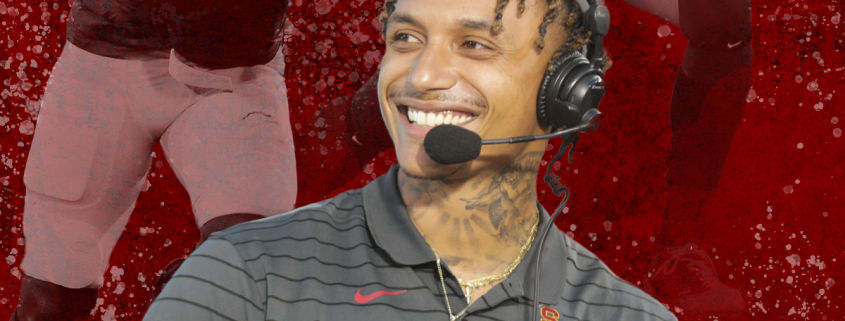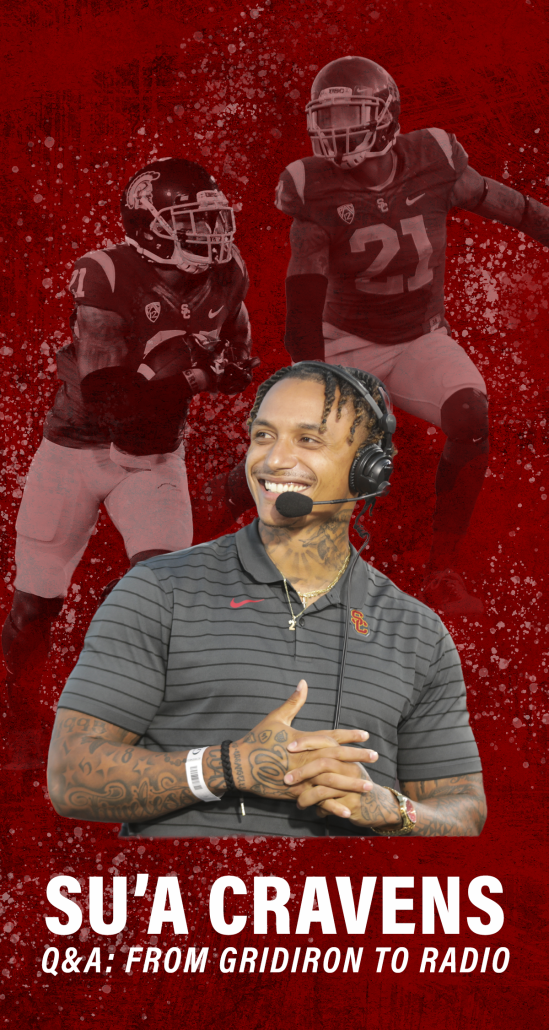Su’a Cravens Q&A: from gridiron to radio
Former USC linebacker Su’a Cravens joined USC football’s radio broadcast show for the 2021 season. Cravens met with the Daily Trojan to share his thoughts on his new job, his transition from player to media member and what USC football can do to get back to its winning ways.
This interview was edited for length and clarity.
Daily Trojan: When did you realize that you had an interest in media and broadcasting?
Su’a Cravens: Growing up, I always used to watch College Football Live like every Saturday. I probably never missed an episode when I was maybe six years old. So I always had an interest in college football and being able to talk college football in the way that they did it. Seeing how the fans react to them picking teams and just talking about different teams, that was always an interest of mine. I just never thought it’d be an actual reality to be able to broadcast or commentate on college football. When I got the opportunity from USC, it was almost like a dream come true. I’ve always had an interest in something like this.
D.T.: How does your experience as a player translate to your game preparation as a broadcaster?
S.C.: It definitely helps because I can look at things that maybe your average fan wouldn’t see. I can bring that to light and help people understand the game from a perspective that I looked at, so that they can maybe get a different version of what they’re used to seeing. But sometimes that can hurt too because I know that people don’t really know all the X’s and O’s of football.
If you try to get too into detail and too complicated with it, you’ll lose the viewers. You’re speaking a different language at that point. It helps when it comes to pointing out unique perspectives, but it also can hinder you because you don’t want to speak in another language because they are fans at the end of the day. They weren’t in the locker room, in the meetings, going over X’s and O’s their whole lives.
D.T.: Do you have anyone, I guess it could be yourself, but maybe even a close friend or a family member that listens to you as a broadcaster and gives you tips?
S.C.: I actually get a lot of feedback from my lady. Every time I have a show she’ll be watching it with my kids. When I come home, she’ll give me pointers like, “You need to add some more of your sauce here. You need to add some more of your own swag right there. You sound too cookie cutter.”
I always hear her voice in my head. Whenever I’m on set, I’m trying to just be like, “Add a little something here. Add a little flavor here.”
D.T.: With the increased popularity and media attention that comes around high school football recruiting, and the concept of three-stars and four-stars, how do you think that’s changed the sport? Specifically, how has that impacted USC?
S.C.: I think we put too much too much on the ratings of recruits. I know plenty of guys who were five-stars coming out of high school who were absolute garbage and didn’t translate to the college level and didn’t ever see the field as a five-star. And I know three-star guys who barely got recruited, who turned out to be NFL Hall of Famers. I think we put too much hype on “stars” and trying to make guys feel a little bit more important than they are because, when you get to college, none of that matters.
When it comes to recruiting, especially with USC, they’re wowed by the big name and the big splash recruit. But they take that five-star label and run with it instead of actually doing the work and finding out who really is a five-star, who really is a dog.
D.T.: What do you think USC could be doing better, in your opinion, to get back to winning or at least contending for the Pac-12 and national championships year in [and] year out?
S.C.: I think we need to stop worrying about being politically correct and stop worrying about what our image looks like. Once we started caring about that is when things started heading downhill. I know when Lynn Swann was [athletic director] and when Pat Haden was [athletic director] that was their major thing: “We do things the right way.”
I’m not saying that’s the wrong thing to say. Of course we’re gonna do things the right way, but when doing things the right way means we don’t care about sports because we’re academics first, I know it’s not the thing to say but that’s just not true.
USC is a sports school and USC is a great place to be when their sports teams are winning. It doesn’t matter if every single student at USC had a 4.0. If our sports are garbage, people are not going to go to USC. That’s just the simple fact of it.
I felt like for a while USC was trying to be Stanford and trying to build up that reputation of “We’re academics, and we just happen to be good at football.” No, no. We are a sports school, and USC’s football is what leads this school. I feel like we got away from that when we made football and recruiting and developing players and just overall athletics, we put that on the back burner, and we didn’t make that a priority, and I think we’ve suffered the consequences because of that.
D.T.: I think it was the Ohio State quarterback, Cardale Jones, who said he went to Ohio State to play football and not to play school.
S.C.: That’s what I’m saying. I’m not saying, “Don’t go to class, school is bad” and all that. I’m not saying that at all. But they really got to the point where I would hear the [athletic director] say, “We are an academic school that happens to be good at athletics.”
I couldn’t disagree more. I’m like, “No, we’re an athletic school that happens to be good at academics.”
D.T.: Is there anything that you want to leave a lasting impression on [with] this Q&A? I’ll leave you with the floor.
S.C.: Come to the games. Be patient with the football team, changes are coming. And fight on, per usual.


